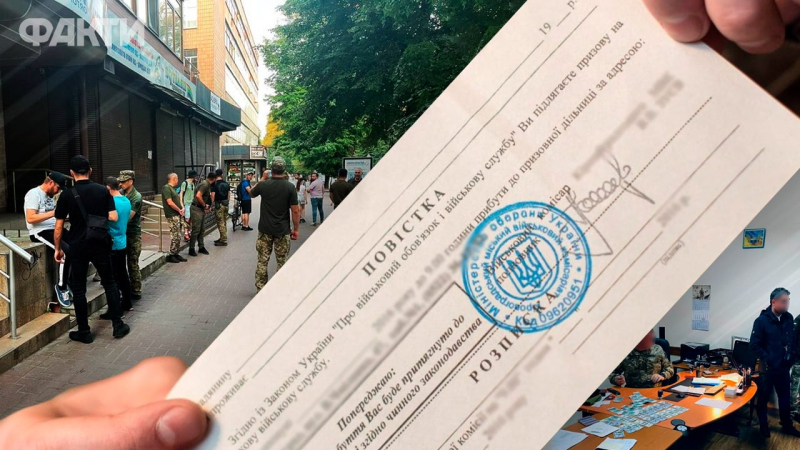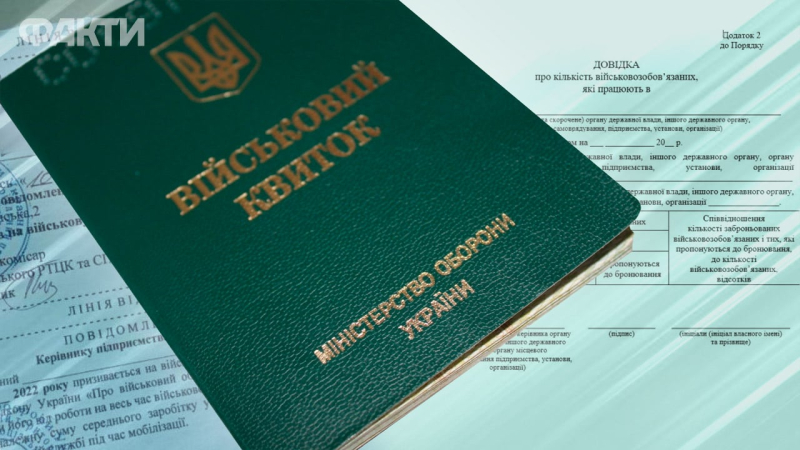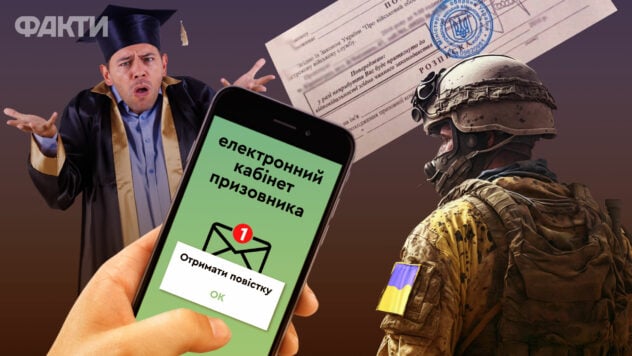30 January The Cabinet of Ministers submitted to parliament an updated bill on military service, mobilization and military registration No. 10449. On the sidelines of the Rada they say that the document may be adopted in the first reading this week, despite a considerable number of discussions moments.
ICTV Facts asked a lawyer from the hotline of the Ukrainian Bar Association on issues related to military aggression, its consequences and martial law, Vladislav Zaitsev about the main provisions of the draft law on mobilization.
— What restrictions are proposed in the government bill on mobilization regarding draft dodgers? Who is a draft dodger in the legal sense?
Now watching
— In Ukrainian legislation there is no such thing as a draft dodger; this word is more for colloquial use, for general perception. But if this term is transferred to the legal plane, then everything will depend on the subject of the law we are talking about such a person.
If we consider within the framework of the new government bill on mobilization, in particular regarding mobilization preparation, then such persons are those who do not fulfill the duties established by law.
According to the law, evaders can be brought to criminal and administrative liability.
Criminal liability for draft evaders

Photo: Facti
Ukrainian legislation contains Article 336 of the Criminal Code, which provides that evasion of conscription for military mobilization is subject to criminal liability. That is, from a legal point of view, draft dodgers — these are persons who commit certain illegal actions that, according to the Criminal Code, are considered a violation and entail liability.
The most typical case — when a person passes a military medical commission, he is declared fit for military service, and immediately after that the person disappears somewhere. Then does not appear by mobilization order. Here we see evasion of conscription for military service. Therefore, there is every reason to initiate criminal proceedings.
Administrative responsibility for draft dodgers
If we talk about administrative liability for draft evaders, it occurs in cases where a person does not arrive at the time specified in the agenda at the territorial center for recruitment and social support (TCC and SP).
That is, a person receives a summons, signs, and at a certain time simply does not come to the TCC. This entails administrative liability, which is defined in Article 210-1 of the Code of Ukraine on Administrative Offenses and entails a fine from 1,700 UAH to 3,400 UAH.
— What are the restrictions for draft dodgers in the new mobilization bill?
— In general, the new bill on mobilization continues the essence of the previous one, which was not considered in the Verkhovna Rada. The new document provides for certain restrictions for persons who do not fulfill established duties during mobilization.
The law provides for three main restrictions:
- temporary restriction on the right to travel abroad;
- temporary restriction on the right to drive vehicles;
- seizure of financial accounts in banks, electronic wallets and the like.
What duties a person must perform during mobilization:
- a person liable for military service assigned to a specific military unit, during mobilization, in case of receiving a summons or mobilization order, must arrive at a certain time and place for training at the TCC;
- a person liable for military service who is not assigned to a military unit, according to the new standards, within 60 days from the date of the start of mobilization must independently appear at the Central Administrative Service, TCC, or in the electronic account to clarify his credentials;
- a person liable for military service who is not assigned to a military unit, in case of receiving a summons, is also obliged to appear at the TCC.
If for certain reasons a person does not fulfill these duties, restrictions may apply.
In the old mobilization bill, decisions on the application of restrictions were made directly by the TCC. In the new draft law on mobilization, changes were made and it was noted that such sanctions can only be applied by the court.
— What is the procedure for bringing to justice?
— So, we have the fact of violation of military duty. First of all, TCC employees must send a letter to the person demanding that he still appear within a certain time frame. If the person does not do this or the post office returned the demand back to the TCC (the person did not receive it or does not live at that address), then the National Police officers are not able to detain the person and take him to the TCC.
In this case, the TCC goes to court with a motion in which it asks to apply one or another restriction to the draft dodger. The court examines the grounds and makes its decision, which, by the way, is subject to immediate execution. Even if a person files an appeal, this will still not stop the execution of the court decision.
After the trial, the decision is transferred to the State Enforcement Service, where the relevant executor accepts it and carries out enforcement. If we talk about the seizure of accounts, the state executive issues a corresponding resolution and sends it to banking institutions, which must carry out the blocking.
If a person has accounts abroad

pixabay
— After receiving a court decision, the state executive will check whether a certain person has accounts abroad. Although I don’t think that government officials have access to registers of international financial institutions.
In my opinion, it is too early to talk about this, because the mobilization bill is only being considered. It will be clear when certain trials begin.
How to unlock accounts
— If a person liable for military service nevertheless appears at the TCC, then the employees of the territorial center issue him a certificate indicating that the person has fulfilled his duty. Such a certificate is sent to the State Enforcement Service, and on this basis the executor is obliged to close the previous proceedings. And the consequence of the end is, for example, the unblocking of bank accounts.
Restriction on the use of vehicles
— As for restrictions on the right to use vehicles, this only applies to the right to drive. There will be no property restrictions — that is, the car will not be seized.
If a person is caught driving, then separate responsibility arises.
— When can a conscript's electronic account start working?
— Both the old and the new mobilization bills provide for a general obligation for all conscripts, military personnel, and reservists to register a personal electronic account. The document does not yet contain any specific dates for when it will start working. Perhaps this will be clarified in the future.
However, here it is necessary to analyze Law No. 10062 (on the procedure for processing and using data in state registers for military registration), which the Verkhovna Rada adopted on January 16, 2024. This law introduced changes to improve the electronic registration of military personnel. And it is this law that provides for the creation of an electronic account for conscripts and those liable for military service.
Document No. 10062 dated January 16 also does not contain details about when electronic accounts will start working. However, the functionality of this cabinet will be determined by the relevant procedure, which will be approved by the Cabinet of Ministers. So far, this additional regulatory framework does not exist.
In addition, on the air of Unified News, Deputy Minister of Defense of Ukraine for Digital Development Ekaterina Chernogorenko said that after the law of January 16 comes into force, the government will begin to work on launching an electronic conscript office. And she stressed that this could happen in the second quarter of 2024. It is clear that here you need to prepare a software base.
— Which categories of citizens will mobilize additionally?
— The new government bill does not change the mobilization itself. That is, just as mobilization began on February 24, 2022, it continues.
According to the new rules, people will be drafted into the army at the age of 25, previously it was at the age of 27. Upper age limit for mobilized no change — it's 60 years old. That is, all men from 25 to 60 years old, if they do not have the right to a deferment from conscription, can join the army.
There have been some discussions about whether it is possible to mobilize persons who have been convicted, are serving a sentence or have been released from serving it. The new bill provides that persons released from serving sentences with probation, except for those convicted of crimes against statehood or national security, can be conscripted with their consent. That is, such a condition was provided for in the new document.
If during the voting people's deputies support this point, then this will be a new category of citizens who will be able to be called up for military service at will.
— Who is exempt from mobilization?
— The government bill on mobilization clarifies the provisions regarding deferment from conscription in a certain way and introduces new categories of citizens who will have it.
The previous draft law stated that only persons with disabilities of groups I and II would have a deferment; group III was not included. This document puts a definitive point on this issue — that is, all persons with disabilities can have a deferment. There will be no changes here.
The draft also clarifies the norm for men who have three or more dependent children. But this will only work for those men who will not have more than three months of alimony debts.
For example, a person liable for military service has three children from two different marriages. But he does not pay child support for one of the children, and the debt exceeded the amount for three months. Despite the fact that such a person is the father of three children, he will not have a deferment from mobilization.
To take advantage of this provision, a person must obtain a certificate from the State Executive Service confirming the absence of debt. If he provides it, as well as other documents for the children, he will receive a deferment.
Caring for relatives with disabilities
The draft law on mobilization removes the provision regarding those persons who have a husband or wife with a disability or parents with a disability of group I or II.
This situation disappears and transforms into a new one, which will depend on what disability group, I or II, the person whose care is needed has.
If we talk about a person with a group I disability, then family members of the first or second degree of kinship will have a deferment from conscription. That is, at this stage, such a concept as the degree of relationship appears. The degrees of relationship are defined in the Tax Code of Ukraine.
If we talk about the first degree of relationship, then these are: parents, husband or wife, natural or adopted children. If we talk about the second degree of kinship, then these are: brothers, sisters, grandparents on both sides, as well as grandchildren.
For example, a person liable for military service has a father with group I disability. According to the new provision in the bill, if this person liable for military service takes care of his father, he will have the right to a deferment.
It is worth noting that persons with disability group I can be cared for by persons of the second degree if there are no first degree relatives.
Also in the bill on mobilization there appears a category of people who are exempt from it — these are judges of general jurisdiction, judges of the Constitutional Court, members of the High Council of Justice and the like. That is, a certain link in the judicial system is added.
— Which military personnel can be released from service?

Facti
— Two categories of military personnel are added to the persons who will not be subject to mobilization. Looking ahead, this mobilization bill also provides for changes regarding the grounds for dismissal from military service.
So those military personnel who, during martial law, served for more than 36 months in a row and whose term is ending, can be exempted from military service. They cannot be mobilized for two years from the date of dismissal. That is, the law provides time for a person to recover.
The second category includes those military personnel who were released from captivity. Under no circumstances will such people be conscripted into the army except by personal consent.
Persons with limited fitness status
The draft law on mobilization proposes to completely eliminate the concept of being partially fit for military service. That is, as a result there will be two categories — good or bad.
This means that all persons who today have a status of limited fitness will have to undergo a military medical commission, according to the results of which they are declared either fit or unfit for military service.
— What is changing for students? What deferment is provided for them? What about students who receive a second or third higher education?

getty images
— The government bill leaves such a basis for exemption from service as studying after school in educational institutions. However, there is a main condition — deferment will only be provided if the student receives a level of education higher than the previous one.
If we do not take into account schooling, then in Ukraine we have the following gradation of levels of education: general, vocational, professional pre-higher and three levels of higher education (bachelor, master and educational-scientific).
For example, if a person studies at a higher educational institution and has a bachelor’s level, then he can enter a master’s program, and then graduate school, and for these periods the student will have a deferment from mobilization. That is, there is a clear sequence of obtaining certain levels of education.
All other students who are currently receiving a second or third higher education will not have such a deferment. For example, if a person has a master’s degree and re-enters a university for a bachelor’s or master’s degree, then he is not exempt from conscription.
Graduate students will have the right to a deferment only if they study on a budget. If a graduate student enters the university on a paid basis, that is, on a contract basis, then he will not have a deferment from conscription under the new draft law on mobilization. This is a rather strange innovation and it is not known why they decided to do this.
Another interesting point: according to the new law, students who receive a second or third higher education will have a deferment only until the end of the current academic year, despite the fact that they may need to complete their studies for another year or two.
Suppose the law on mobilization comes into force in March of this year, then all students who are currently receiving a second or third higher education will have a deferment until the end of the 2024 academic year. Usually this is May or June.

